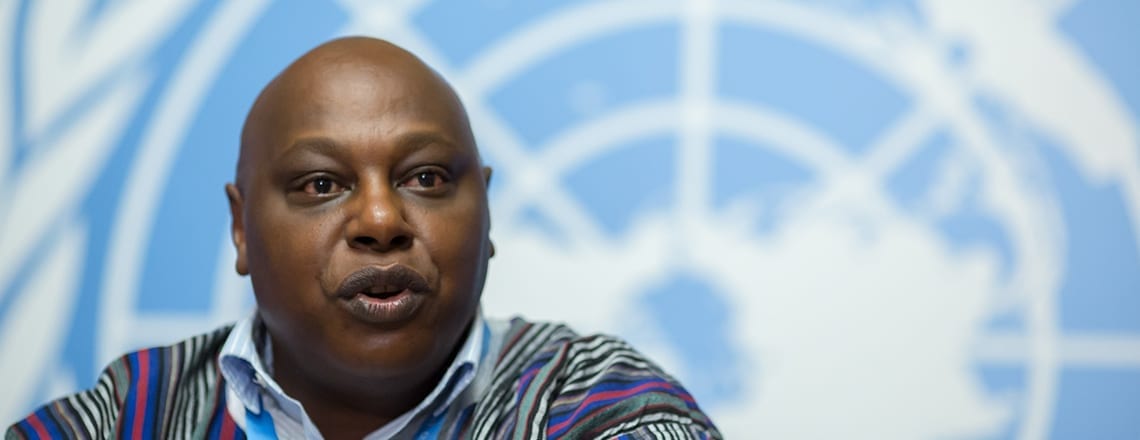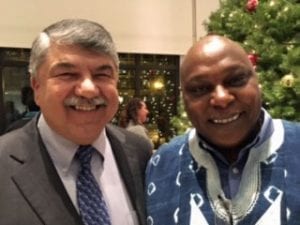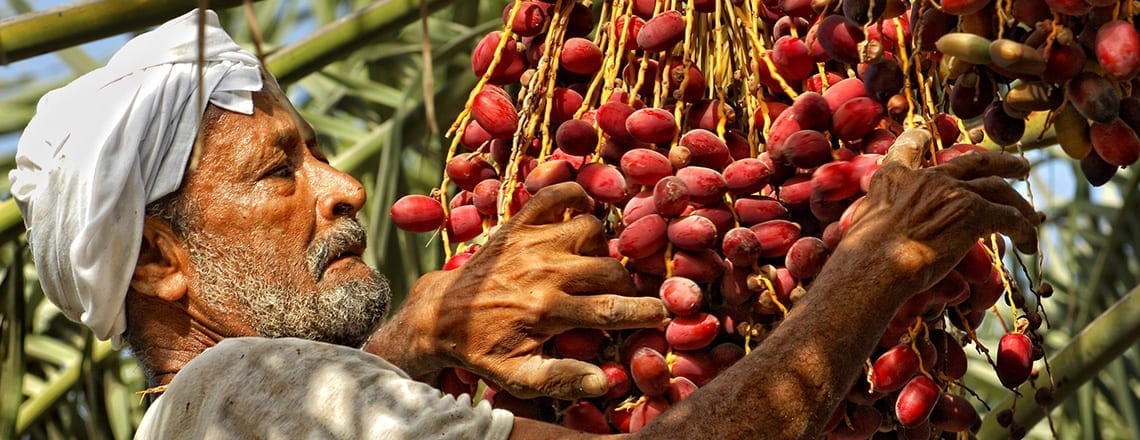
Dec 15, 2016
Describing United Nations Special Rapporteur Maina Kiai as “an effective watchdog against crackdowns of freedom of association and assembly,” AFL-CIO President Richard Trumka presented Kiai with the 2016 AFL-CIO George Meany-Lane Kirkland Human Rights Award.

AFL-CIO President Richard Trumka (left) presented the AFL-CIO Human Rights Award to UN Special Rapporteur Maina Kiai. Credit: Solidarity Center/Tula Connell
“Maina inspires the advocates and workers who struggle to defend, to maintain and to grow the institutions of civil societies around the world,” said Trumka, speaking at the award ceremony last night in Washington, D.C. I’m talking about those who organize for women’s rights and workers’ rights, for indigenous people, for immigrants, for religious freedom and for economic justice.” (Watch the video of the full event.)
As UN Special Rapporteur on the rights to freedom of peaceful assembly and of association, Kiai in October presented the landmark “Rights to Freedom of Peaceful Assembly and of Association” report to the UN General Assembly. The report forcefully conveys how the vast majority of the world’s workers are disenfranchised from their rights to assembly and association—rights that are fundamental to all other human rights—either by exclusion or outright oppression.
‘Labor Rights Are Human Rights’
In his acceptance speech, Kiai outlined the challenges faced by champions of economic and social justice around the world, but called on labor and human rights activists to take successful lessons from the past to counter opposition to achieving fundamental human rights.
“Labor rights are human rights and human rights are labor rights,” Kiai said. “Today, we need to work differently. We need to reach out to each other. We know that every major struggle in the world has been successful through a grand alliance of trade unions and human and civil rights activists.”
Kiai previously served as head of the Kenya Human Rights Commission, and the Central Organization of Trade Unions–Kenya applauded Kiai, saying “the award singles out Maina for advancing worker and human rights issues and specifically highlighting the widespread denial of fundamental human rights at work.”
Kiai: Witness to Workers’ Struggles Worldwide
Since becoming special rapporteur in 2011, Kiai has traveled around the world, speaking with marginalized people in developed and developing countries, including workers, and hearing their struggles to exercise their fundamental rights firsthand, while speaking out about the abuses and injustices he has witnessed.
“I want to thank you for having the courage to speak up for truth,” said Trumka. “Your courage inspires all of us. Your integrity is a beacon to all of us.”
The annual Meany-Kirkland award, created in 1980 and named for the first two presidents of the AFL-CIO, recognizes outstanding examples of the international struggle for human rights through trade unions. Speakers at the event included Rep. Jamie Raskin (D-MD) and two worker Kiai met while traveling through the United States on a fact-finding mission this year, Lee Ruffin and Daniel Castellaños, founder of the National Guestworker Alliance.
The award went to the Trade Union Congress of Swaziland (TUCOSWA) in 2015; Building and Wood Workers’ International (BWI) and its affiliates in 2014; the International Domestic Workers Federation (IDWF) in 2013 and the Tunisian General Union of Labor (UGTT) and the General Federation of Bahrain Trade Unions (GBFTU) in 2012.

May 23, 2016
Update: The survey is now available in Spanish and French.
La encuesta está disponible en francés y español.
L’enquête est disponible en français et espagnol.
The United Nations Special Rapporteur is partnering with the Solidarity Center to research a report on the links between the political, social, and economic exclusion of workers, their associations and trade unions. The following article from the UN Special Rapporteur website describes how you can participate.
The globalization of the world economy in the past half-century has contributed to a dramatic rise in the power of large multinational corporations and has concentrated wealth in fewer hands. State power to regulate these business entities, meanwhile, has been simultaneously eroded and co-opted by elite economic actors themselves.
Unconstrained power – whether public or private in origin – is now, more than ever, a critical threat to the protection of human rights. This power shift has created a challenging environment for the enforcement of human rights, as Special Rapporteur Maina Kiai has documented in his two most recent reports on natural resource exploitation and the imbalance between how States treat businesses and civil society.
For his next report to the UN General Assembly (October 2016), the Special Rapporteur plans to explore a new dimension of this power shift: its effect on the rights to freedom of peaceful assembly and of association of workers – specifically the most marginalized portions of the world’s labor force, such as global supply chain workers, informal workers, migrant workers and domestic workers. He will also examine the gender and racial dimensions of the issue.
The Special Rapporteur is particularly interested in the links between the political, social, and economic exclusion of workers, their associations and trade unions, as expressed in:
- The limitation and/or criminalization of assembly and association rights in law and in practice (and acquiescence of the State when these rights are breached by state or private actors);
- The exclusion of workers in the informal economy from legal frameworks recognizing assembly and association rights;
- The strategy to informalize more work for the purpose of limiting or excluding workers from exercising their assembly and association rights;
- The lack of effective global governance of migration, which has led to the exploitation of migrant workers
The Special Rapporteur will also explore the interplay between the lack of assembly and association rights for workers and the health of these rights within a society as a whole.
What’s your opinion and experience?
The Special Rapporteur convened an expert consultation to discuss this subject in May 2016. But he would also like to hear your views. He is particularly interested in specific, real-world examples of how the assembly and association rights of workers are being both eroded and bolstered. These examples may be included in the report.
How to submit information for the report
For more details on the report, please see our concept note. For specific questions that the Special Rapporteur is looking to answer, please see the following questionnaires. Note that each file has three separate questionnaires: One for UN member states, one for businesses and one for civil society/unions/workers. Please answer only the questionnaire that corresponds to your position:
Questionnaires in English
Questionnaires in Spanish (coming soon)
Questionnaires in French (coming soon)
In responding to the questionnaire, please be sure to provide as much detail as possible and to specify which countries you are referring to.
Completed questionnaires should be e-mailed to [email protected]. We will be accepting submissions until June 30, 2016. You may submit your responses in English, French or Spanish.
The Solidarity Center will assist with researching the report. Responses to the questionnaires will be shared with select Solidarity Center staff prior to the publication of the report.



